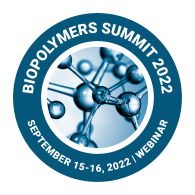Biobased Thermosetting Polymers
Thermosetting plastics are polymer materials that are fluid or mouldable at low temperatures, yet which differ irreversibly to end up hard at high temperatures. A remarkable exertion is in progress to perceive biobased epoxy gums that can substitute for present oil based materials, for example, bis-phenol A diglycidyl ether[C21H24O4] (BADGE). Lamentably, bis-phenol A (BPA) is specially hazardous as it is detached as a reprotoxic R2 substance and an endocrine disruptor. Over 60% of the general making is exploit as a part of the coatings business. Moreover, epoxies are visibly the most flexible group of cements since they are smoothly with numerous substrates, and can be effortlessly adjusted to accomplish generally fluctuating properties. Control of properties and furthermore preparing is typically in view of the purpose of the compelling epoxy portents or mix of monomers, on the choice of curing operators and connected response system, and on the attension of natural or inorganic fillers and parts. Work is in growth to create BPA substitutions from different bio-based feed stocks' also lignin determined chemicals.
- Reactive injection moulding (used for objects such as milk bottle crates).
- Extrusion molding (used for making pipes, threads of fabric and insulation for electrical cables).
- Compression molding (used to shape SMC and BMC thermosetting plastics).
- Spin casting (used for producing fishing lures and jigs, gaming miniatures, figurines, emblems as well as production and replacement parts)
Related Conference of Biobased Thermosetting Polymers
Biobased Thermosetting Polymers Conference Speakers
Recommended Sessions
- Application of Bioplastics in Medicine
- Biobased Thermosetting Polymers
- BiocompositeMaterials
- Biodegradable Polymers
- Bioplastic based on starch and cellulose nanocrystals from rice straw
- Bioplastics
- Biopolymers for Tissue Engineering and Regenerative Medicine
- Biopolymersand Biomaterials
- Contingency of Biopolymers
- Environmental Issues of Recycling and Sustainability Models
- Future and Scope for Biopolymers and Bioplastics
- Green Composites and Biopolymers
- Imminent Ambits of Biopolymers
- NaturalPolymer-Advanced Polymers & its phenomenon
- Ocean plastics
- Plastic Fouling and Treatment
- PolymersNanotechnology.
- Production and Commercialization
- Synthesis and Characterization of Biopolymers
- Waste Management and Reuse Processes
Related Journals
Are you interested in
- 3D Printing in Microfluidics - Microfluidics 2026 (Germany)
- AI & Automation in Microfluidic Systems - Microfluidics 2026 (Germany)
- Biomedical Microfluidic Applications - Microfluidics 2026 (Germany)
- Clinical Translation & Commercialization - Microfluidics 2026 (Germany)
- Droplet-Based Microfluidics - Microfluidics 2026 (Germany)
- Lab-on-a-Chip Innovations - Microfluidics 2026 (Germany)
- Microfabrication & Soft Lithography - Microfluidics 2026 (Germany)
- Microfluidic Biosensors & Diagnostics - Microfluidics 2026 (Germany)
- Microfluidic Cell Culture Platforms - Microfluidics 2026 (Germany)
- Microfluidics for Drug Delivery - Microfluidics 2026 (Germany)
- Microreactors & Chemical Processing - Microfluidics 2026 (Germany)
- Nanofluidics & Molecular Transport - Microfluidics 2026 (Germany)
- Organ-on-Chip Engineering - Microfluidics 2026 (Germany)
- Point-of-Care Microdevices - Microfluidics 2026 (Germany)
- Single-Cell Microfluidic Analysis - Microfluidics 2026 (Germany)

